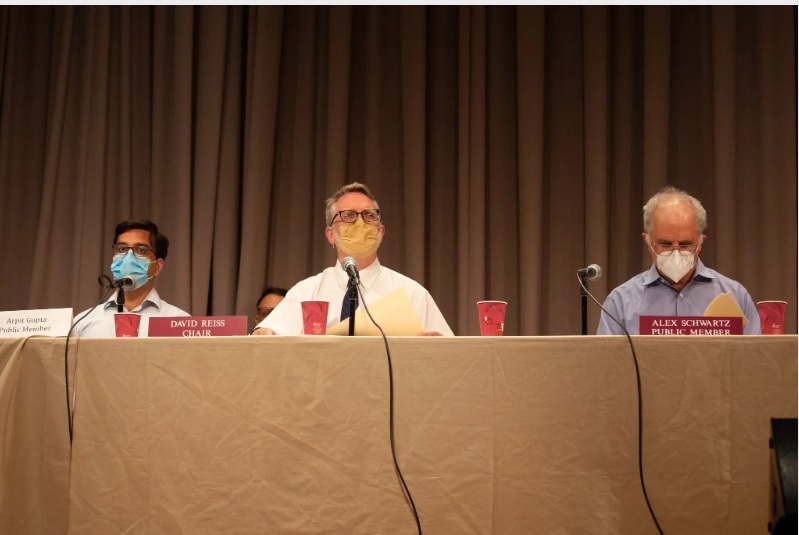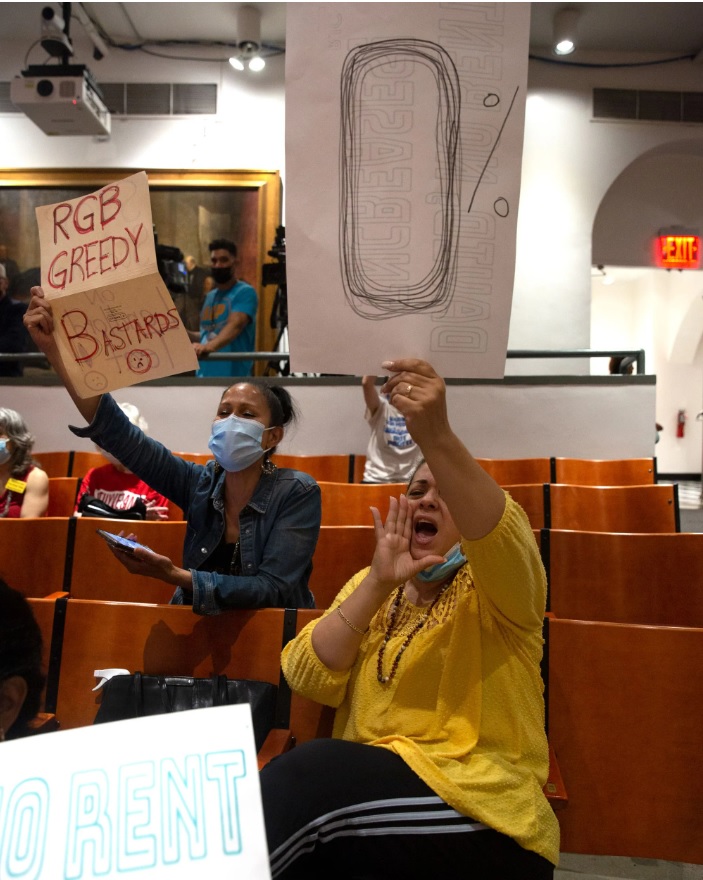
Tenant advocates packed into Cooper Union’s Great Hall to protest the Rent Guidelines Board’s vote Tuesday night, June 21, 2022.Ben Fractenberg/THE CITY

This article was originally published by The CITY on June 21
A sharply divided Rent Guidelines Board voted to increase rents for the city’s nearly 1 million rent regulated apartments by 3.25% in the coming year in a decision that satisfied neither tenants nor landlords.
The proposal put forward by Board Chair David Reiss passed by only 5 to 4. It also raised rents by 5% on two-year leases.
The hike, the first decision under Mayor Eric Adams, is the largest since 2013, when the board increased rents on one-year leases by 4%. During the eight years of Mayor Bill de Blasio rents increased by an average of just over 1%.
“The rise in owners’ costs justifies an increase,” said Reiss in defending his proposal. But he also noted that the board had to consider the plight of residents, where half of rent stabilized tenants who do not receive other benefits pay 30% or more of their income toward housing.
He also noted that inflation in the New York area, at about 6% annually, was much higher than in previous years, and also lower than the national rate of 8.5% — in part because of the small increases in regulated rents in recent years.
Landlord groups, who have pointed to increased costs for property taxes, insurance, water and sewer service and insurance, immediately blasted the increase as hopelessly inadequate, noting the original staff proposal called for increases as high as 4.5% for one-year leases.
“The data is clear. The adjustment approved by the RGB today will not put a penny of profit in the pockets of small property owners. The RGB has simply taken steps to limit their losses for the next year,” said Jay Martin, Executive Director of the Community Housing Improvement Program (CHIP).
‘Shame on This Administration’
Tenant advocates were equally unhappy, arguing that the pandemic had so devastated their livelihoods that they simply cannot afford to pay any more for rents. Tenants in the audience chanted throughout the hearing and increased the volume when landlord representatives proposed even higher increases and Reiss offered his proposal.

David Reiss, center, chairs the Rent Guidelines Board, which voted Tuesday at Cooper Union’s Great Hall to increase rents for rent-stabilized apartments.
Ben Fractenberg/THE CITY
Adán Soltren, a tenant member on the board and an attorney at the Legal Aid Society, put forth a proposal — which was voted down — for a rent freeze for one-year leases and a 2% increase for two-year leases. He emphasized that throughout the board’s weeks-long process of hearings and deliberations on rent levels, he felt the board’s emphasis on property owners’ revenue over tenants’ well-being was clear.
“The fact that members of this board began earnestly asking, more than once, ‘Well are tenants really struggling that badly?’ is illuminating enough,” he said. “Who asks that during an ongoing pandemic, when inflation is at 8%, with homelessness and evictions at record levels?”
“Shame on this administration, and any administration, that would put members in place on this board that clearly believe that investments deserve more respect than people,” he added.
Jumaane Williams, the city public advocate and candidate for New York governor, criticized the proposed increase ahead of the vote.
“Landlords cannot get more money from people who just don’t have it, and the eviction crisis will only become more entrenched,” he said in a statement. “If the Board follows through with the proposed increases, they vote to add even more families, children, disabled New Yorkers, and lifelong neighbors to that number.
Adams, who promised in March to let the data dictate what the board decided, tried to distance himself from the decision. He again took credit for the board’s decision to adopt a lower rent increase than recommended by the board’s staff.
“While we raised our voices and were successful in pushing the increases lower, the determination made by the Rent Guidelines Board today will unfortunately be a burden to tenants at this difficult time — and that is disappointing,” he said. “At the same time, small landlords are at risk of bankruptcy because of years of no increases at all, putting building owners of modest means at risk while threatening the quality of life for tenants who deserve to live in well-maintained, modern buildings.”
Financial Pressures
At the board’s meeting at Cooper Union’s Great Hall in Manhattan, both tenant advocates and landlords called on both City Hall and Albany to take steps to reduce the costs on landlords so that rent increases could be limited.
The two tenant representatives on the board — Adan Soltran and Sheila Garcia — and Christian Gonzalez-Rivera, who is one of four appointed “public members,” joined widespread calls for reform of the city’s property tax system, which taxes multi-family rentals at far higher rates than single family homes, condos and coops.
Gonzalez-Rivera noted that taxes make up 36% of a landlord’s operating costs. He urged lawmakers to wholly revamp the property tax system.
He urged lawmakers to wholly revamp the property tax system.
“We need to blow up this system that depends solely on higher rents to properly maintain the housing stock,” he said. “Rent does not have to be the only source of funds to cover maintenance costs.”

Tenant advocates packed into Cooper Union’s Great Hall to protest the Rent Guidelines Board’s vote Tuesday night. Ben Fractenberg/THE CITY
Landlord advocates called for similar moves.
“The government needs to find other ways to lower the costs,” said Martin, whose group represents small and medium-sized landlords of rent regulated apartments.
The Rent Stabilization Association, which represents large landlords as well, detailed a specific list of steps for government officials to take.
“Albany lawmakers need to act with a housing policy package that reforms property taxes, addresses sharply rising insurance rates and other costs, and – most importantly – legislates a rent voucher subsidy program that will cast a wider net in keeping the most vulnerable tenants in their homes,” said RSA president Joseph Strasburg.
The board’s decision affects New York’s more than 900,000 rent regulated apartments. The rent hikes will apply to leases that begin between Oct. 1, 2022, and Sept. 30, 2023.
The process began this spring when the Board’s staff recommended increases of 2.7% and 4.5% for one-year leases and 4.3% to 9% for two-year leases.
A Rent Guidelines Board staff report earlier this year showed that because of higher costs, net operating income, which doesn’t include mortgage payments, dropped by 7.8% between 2019 and 2020, the largest decline in 17 years. Property owners also argued that the sudden surge in inflation this year has sent costs higher, especially for energy.
Financial pressure on tenants is immense. At least $1.6 billion in rent is owed in the five boroughs, estimates the National Equity Atlas. Eviction cases have overwhelmed the city’s court systems since a pandemic moratorium ended in January. Unemployment, particularly among Black New Yorkers, remains much higher than the national average.
The RGB’s decision comes as the unregulated rental market continues to see record price increases. In Manhattan, the median rental price per month hit $4,000 in May. Accounts of bidding wars and apartment scarcity abound.
THE CITY is an independent, nonprofit news outlet dedicated to hard-hitting reporting that serves the people of New York.
18 Comments

This is what happens when you vote demoRATS
Oh..I wonder why they have so much power.
While small building landlords who live in their buildings might be hurting, big landlords, who live nowhere near their buildings, and do not see the poor conditions that exist, are certainly not! Tenants, in many if not most, are. This increase just adds to the hardships
What did you think was going to happen after minimum wage increased to 15 dollars an hour, minimum income eligibility for benefits and rent vouchers increased and most of us got stimulus money during the pandemic with the eviction moratorium in nyc? My rent increased by $250 a month. Everyone is moving back to Nyc. Pandemic deals where landlords begged tenants to move in is pretty much over with. Its time to tax the rich.
My roommate texted me today and said our rent is going up!
Then, tell these slumlords to maintain their damn property. Get a handle on the roaches and all of the other BS that tenants put up with.
Inflation will cool, prices will drop but will the rent ever follow suit? Will the issues in the buildings that have existed prior to the pandemic be fixed?
Increase the rent but none of that money gets invested in the building smh buildings are outdated barely heat in the winter rat problems but want more money sad
Landlords already have more power, but sure lets add to that. Anyone who thinks that an investment in property is more important than a human right is a fool!!! Joy Won please help!!
It only means the further impoverishment of New Yorkers. But as we ALL know, the answer to the lack of affordable housing and the increasing poverty in America is to import millions more of poor people from other countries. What could be more logical?
it defies logic but the majority will be on the proverbial dole so the landlords will get their money & ultimately all of us will be paying for increases whether they actually happen to us personally or not
Everyone is still recovering from this pandemic but sure lets increase rent. That sounds like the right thing to do.
Damn! That’s awful. people just can’t get a break.
As the mass exodus from NYC continues with the high crime rate driving most people out, those that stayed will jump ship now! Florida is going to get real crowded!
Gia-There is no mass exodus from NYC. According to US Census NYC added 600,000 from 2010 Census. People are leaving upstate not NYC.
Higher rent for those who squat, want to live for free and pay nothing anyway.
Landlords are the ones crying that their property taxes are rising. So if they can’t afford the property tax then they should sell.
they want you to live in a pod. own nothing yet be happy. you have no choice, yet all your needs will be met.